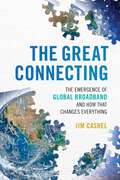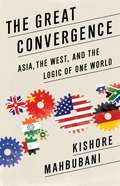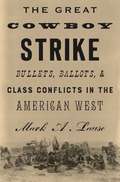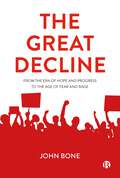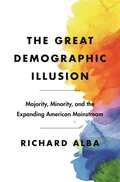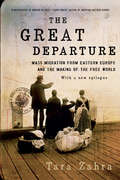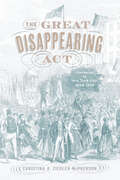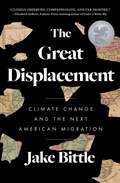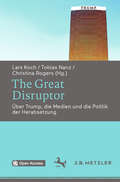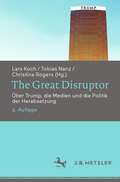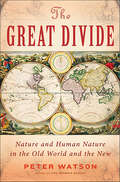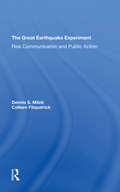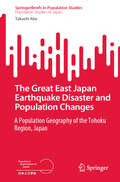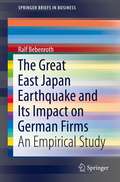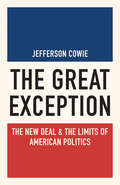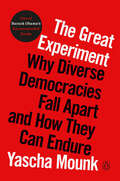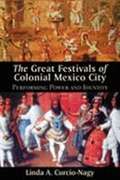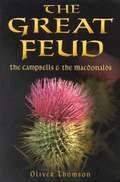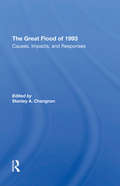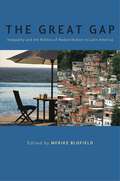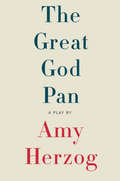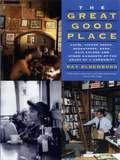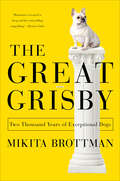- Table View
- List View
The Great Connecting: The Emergence of Global Broadband and How That Changes Everything
by Jim CashelJim Cashel shares his predictions of what may be the biggest event in human history, and it will happen in just the next few years. For the first time, affordable broadband will reach even the poorest and most remote of global citizens, giving access to information, communications, identity authentication, government programs, global philanthropy, online banking, telehealth, distance education, and other powerful services heretofore impossible. Cashel speaks with the major players driving the broadband revolution and travels to the most remote corners of the globe to consider the changes in our world about to take place.
The Great Convergence: Asia, the West, and the Logic of One World
by Kishore MahbubaniThe twenty-first century has seen a rise in the global middle class that brings an unprecedented convergence of interests and perceptions, cultures and values. Kishore Mahbubani is optimistic. We are creating a new global civilization. Eighty-eight percent of the world's population outside the West is rising to Western living standards, and sharing Western aspirations. Yet Mahbubani, one of the most perceptive global commentators, also warns that a new global order needs new policies and attitudes. Policymakers all over the world must change their preconceptions and accept that we live in one world. National interests must be balanced with global interests. Power must be shared. The U. S. and Europe must cede some power. China and India, Africa and the Islamic world must be integrated. Mahbubani urges that only through these actions can we create a world that converges benignly. This timely book explains how to move forward and confront many pressing global challenges.
The Great Cowboy Strike: Bullets, Ballots & Class Conflicts in the American West
by Mark LauseWhen cowboys were workers and battled their bossesIn the pantheon of American icons, the cowboy embodies the traits of “rugged individualism,” independent, solitary, and stoical. In reality, cowboys were grossly exploited and underpaid seasonal workers, who responded to the abuses of their employers in a series of militant strikes. Their resistance arose from the rise and demise of a “beef bonanza” that attracted international capital. Business interests approached the market with the expectation that it would have the same freedom to brutally impose its will as it had exercised on native peoples and the recently emancipated African Americans. These assumptions contributed to a series of bitter and violent “range wars,” which broke out from Texas to Montana and framed the appearance of labor conflicts in the region. These social tensions stirred a series of political insurgencies that became virtually endemic to the American West of the Gilded Age. Mark A. Lause explores the relationship between these neglected labor conflicts, the “range wars,” and the third-party movements. The Great Cowboy Strike subverts American mythology to reveal the class abuses and inequalities that have blinded a nation to its true history and nature
The Great Decline: From the Era of Hope and Progress to the Age of Fear and Rage
by John BoneIt seems clear that many formerly stable societies in wealthy developed countries appear to be falling into an apparent state of ‘permacrisis' accompanied by an increasingly angry and irrational social and political culture that is undermining the peace and stability of our societies and democratic institutions, from the local to the global. Applying an original biosocial approach (the social map), and drawing on ideas and evidence from sociology, history and political economy, to psychology, neuroscience and epigenetics, John Bone argues that conditions in our turbocapitalist and increasingly estranged, media dominated societies have created a toxic environment, deeply damaging to our mental and physical health. As well as shedding new light on our current troubles, Bone also outlines why this leaves us ill prepared to deal with two of the greatest challenges confronting humanity: the rise of AI and automation and how we deal with climate change.
The Great Demographic Illusion: Majority, Minority, and the Expanding American Mainstream
by Richard AlbaWhy the number of young Americans from mixed families is surging and what this means for the country’s future Americans are under the spell of a distorted and polarizing story about their country’s future―the majority-minority narrative―which contends that inevitable demographic changes will create a society with a majority made up of minorities for the first time in the United States’s history. The Great Demographic Illusion reveals that this narrative obscures a more transformative development: the rising numbers of young Americans from ethno-racially mixed families, consisting of one white and one nonwhite parent. Examining the unprecedented significance of mixed parentage in the twenty-first-century United States, Richard Alba looks at how young Americans with this background will play pivotal roles in the country’s demographic future.Assembling a vast body of evidence, Alba explores where individuals of mixed parentage fit in American society. Most participate in and reshape the mainstream, as seen in their high levels of integration into social milieus that were previously white dominated. Yet, racism is evident in the very different experiences of individuals with black-white heritage. Alba’s portrait squares in key ways with the history of immigrant-group assimilation, and indicates that, once again, mainstream American society is expanding and becoming more inclusive.Nevertheless, there are also major limitations to mainstream expansion today, especially in its more modest magnitude and selective nature, which hinder the participation of black Americans and some other people of color. Alba calls for social policies to further open up the mainstream by correcting the restrictions imposed by intensifying economic inequality, shape-shifting racism, and the impaired legal status of many immigrant families.Countering rigid demographic beliefs and predictions, The Great Demographic Illusion offers a new way of understanding American society and its coming transformation.
The Great Departure: Mass Migration from Eastern Europe and the Making of the Free World
by Tara Zahra"With a combination of deft historical analysis, sparkling prose, and careful attention to individual stories, both poignant and instructive, The Great Departure is brimming with important and suggestive lessons from the past for thinking about the worldwide dynamics of emigrants and refugees in our own day."--Norman M. Naimark, Stanford University Between 1846 and 1940, more than 50 million Europeans moved to the Americas, irrevocably changing both their new homes and the ones they left behind. In this groundbreaking study, Tara Zahra explores the deeper story of this astonishing movement of people--one of the largest in human history. The great exodus out of Eastern Europe hollowed out villages with dizzying speed. As villages emptied and the fear of depopulation ran rampant, anxiety over "American fever" prevailed, leading to the scapegoating of Jewish emigration agents. Yet others saw vast opportunity: to seed colonies of migrants like the Polish community in Argentina, to gain economic advantage from an inflow of foreign currency, or to reshape their communities in a new land. In the United States, their migration fostered the notion of the "land of the free." Globally, the policies that gave shape to this migration provided the precedent for future events such as the Holocaust, the closing of the Iron Curtain, and the tragedies of ethnic cleansing. A sweeping history of the most consequential social phenomenon of the twentieth century, The Great Departure gives poignant attention to the individuals whose lives were transformed by these decades of mass departure, and a keen historical perspective on their continuing legacy.
The Great Disappearing Act: Germans in New York City, 1880-1930
by Christina A. Ziegler-McPhersonWhere did all the Germans go? How does a community of several hundred thousand people become invisible within a generation? This study examines these questions in relation to the German immigrant community in New York City between 1880-1930, and seeks to understand how German-American New Yorkers assimilated into the larger American society in the early twentieth century. By the turn of the twentieth century, New York City was one of the largest German-speaking cities in the world and was home to the largest German community in the United States. This community was socio-economically diverse and increasingly geographically dispersed, as upwardly mobile second and third generation German Americans began moving out of the Lower East Side, the location of America’s first Kleindeutschland (Little Germany), uptown to Yorkville and other neighborhoods. New York’s German American community was already in transition, geographically, socio-economically, and culturally, when the anti-German/One Hundred Percent Americanism of World War I erupted in 1917. This book examines the structure of New York City’s German community in terms of its maturity, geographic dispersal from the Lower East Side to other neighborhoods, and its ultimate assimilation to the point of invisibility in the 1920s. It argues that when confronted with the anti-German feelings of World War I, German immigrants and German Americans hid their culture – especially their language and their institutions – behind closed doors and sought to make themselves invisible while still existing as a German community. But becoming invisible did not mean being absorbed into an Anglo-American English-speaking culture and society. Instead, German Americans adopted visible behaviors of a new, more pluralistic American culture that they themselves had helped to create, although by no means dominated. Just as the meaning of “German” changed in this period, so did the meaning of “American” change as well, due to nearly 100 years of German immigration.
The Great Displacement: Climate Change and the Next American Migration
by Jake BittleShortlisted for the 2024 Carnegie Medal for Excellence &“The Great Displacement is closely observed, compassionate, and far-sighted.&” —Elizabeth Kolbert, Pulitzer Prize–winning author of Under a White Sky The untold story of climate migration in the United States—the personal stories of those experiencing displacement, the portraits of communities being torn apart by disaster, and the implications for all of us as we confront a changing future.Even as climate change dominates the headlines, many of us still think about it in the future tense—we imagine that as global warming gets worse over the coming decades, millions of people will scatter around the world fleeing famine and rising seas. What we often don&’t realize is that the consequences of climate change are already visible, right here in the United States. In communities across the country, climate disasters are pushing thousands of people away from their homes.A human-centered narrative with national scope, The Great Displacement is &“a vivid tour of the new human geography just coming into view&” (David Wallace-Wells, New York Times bestselling author of The Uninhabitable Earth). From half-drowned Louisiana to fire-scorched California, from the dried-up cotton fields of Arizona to the soaked watersheds of inland North Carolina, people are moving. In the last few decades, the federal government has moved tens of thousands of families away from flood zones, and tens of thousands more have moved of their own accord in the aftermath of natural disasters. Insurance and mortgage markets are already shifting to reflect mounting climate risk, pricing people out of risky areas. Over the next fifty years, millions of Americans will be caught up in this churn of displacement, forced inland and northward in what will be the largest migration in our country&’s history. The Great Displacement compassionately tells the stories of those who are already experiencing life on the move, while detailing just how radically climate change will transform our lives—erasing historic towns and villages, pushing people toward new areas, and reshaping the geography of the United States.
The Great Disruptor: Über Trump, die Medien und die Politik der Herabsetzung
by Lars Koch Tobias Nanz Christina RogersDieser Open Access-Band untersucht aus kultur- und medienwissenschaftlicher Perspektive das öffentliche Auftreten von Donald Trump und nimmt dabei insbesondere in den Blick, wie der US-amerikanische Präsident an der gesellschaftlichen Konfrontation unterschiedlicher politischer Gruppen partizipiert und diese kommunikativ weiter forciert. Diskutiert werden Trumps Mediengebrauch, seine Adressierungsstrategien und seine Politik der Affekte. Die Beiträge des Bandes rücken den „great disruptor“ in ein Spannungsfeld von Populärkultur, fragmentierter Öffentlichkeit und rhetorischer Feindsetzung.
The Great Disruptor: Über Trump, die Medien und die Politik der Herabsetzung
by Lars Koch Tobias Nanz Christina RogersDer Sturm auf das Kapitol bildet den Höhepunkt einer populistischen Konfrontations- und Mobilisierungsstrategie, die darauf ausgelegt war, Zustimmung durch eine Politik der Herab- und Feindsetzung zu akkumulieren. In der aktualisierten, 2. Auflage geht es weiterhin darum, aus kultur- und medienwissenschaftlicher Perspektive das öffentliche Auftreten von Donald Trump zu untersuchen und zu zeigen, wie der 45. US-Präsident an der gesellschaftlichen Konfrontation unterschiedlicher politischer Gruppen partizipierte, diese kommunikativ weiter eskalierte und von der sich immer radikaler gestaltenden Polarisierung politisch zu profitieren hoffte. Allerdings weitet sich der Untersuchungsfokus und nimmt nunmehr auch die beiden letzten Jahre seiner Amtszeit mit in den Blick, in denen Trump durch immer schrillere Töne im Kontext von Black Live Matters und der Corona-Krise, durch die Anheizung von Verschwörungstheorien und durch radikale Diskreditierung von politischen Verfahren und Institutionen die US-amerikanische Gesellschaft bis an den Rand eines Bürgerkriegs getrieben hat. Diskutiert werden Trumps Mediengebrauch, seine mit Herabsetzungen, Beleidigungen und Unterstellungen arbeitenden Adressierungsstrategien und seine Politik der Affekte. Die Beiträge des Bandes rücken den „great disruptor“ in ein Spannungsfeld von Populärkultur, fragmentierter Öffentlichkeit und rhetorischer Feindsetzung.
The Great Divide: Nature and Human Nature in the Old World and the New
by Peter WatsonIn The Great Divide, acclaimed author and historian Peter Watson explores the development of humankind between the Old World and the New, and offers a groundbreaking new understanding of human history.By 15,000 BC, humans had migrated from northeastern Asia across the frozen Bering land bridge to the Americas. When the last Ice Agecame to an end, the Bering Strait refilled with water, dividing America from Eurasia. This division continued until Christopher Columbus voyaged to the New World in the fifteenth century.The Great Divide compares the development of humankind in the Old World and the New between 15,000 BC and AD 1,500. Combining the most up-to-date knowledge in archaeology, anthropology, geology, meteorology, cosmology, and mythology, Peter Watson’s masterful study offers uniquely revealing insight into what it means to be human.
The Great Earthquake Experiment: Risk Communication And Public Action
by Dennis Mileti Colleen FitzpatrickThis book portrays the history, causes and future of large earthquakes in the US and traces the evolution of government policy to deal with it. It reviews the range of human actions that can be taken to manage or lessen quake losses and presents a review of the current technology to predict quakes.
The Great East Japan Earthquake Disaster and Population Changes: A population geography of the Tohoku Region, Japan (SpringerBriefs in Population Studies)
by Takashi AbeThe book aims to clarify from a demographic and geographical perspective how population trends of the Tohoku Region were changed as a result of the GEJED. The author shows how different the 2011 GEJED was from past disasters in this region with regard to the impacts on population change in the Tohoku Region. He explains how the recent disaster is different from past disasters, based on the theories of the first and second demographic transitions. He also clarifies the causality between the extent of housing damage and mortality through geographical analysis. Furthermore, this book shows how migration patterns were changed before and after the GEJED, and it identifies the differences between the areas affected by the tsunami and by the nuclear power plant accident.Investigating the GEJED as a case study, the book presents a method to analyze the relationship between natural disasters and population change. This book is especially useful for researchers inthe fields of disaster, environment, and population to better understand the relationship between the environment and population.
The Great East Japan Earthquake and Its Impact on German Firms
by Ralf BebenrothThis publication sheds light on how Japan-based German firms dealt with the impact of the Great East Japan Earthquake that occurred in March 2011. To gather data, a questionnaire was developed and sent out in April 2012 to 244 German subsidiaries based in the Kanto area, mainly in Tokyo, with replies received from the top managers of 84 firms. In addition, the author conducted follow-up interviews with top managers of 14 of those firms in Tokyo to illuminate interesting aspects of the responses given in the questionnaires. It is shown that the overall impact on the performance of German firms was comparatively low. Those firms have now returned to normal operation and face relatively few disaster-related problems. However, firms with higher autonomy more frequently moved their offices either to the Kansai area, including Osaka, Kobe and Kyoto, or at least temporarily closed down. In retrospect, the interviews made clear that relocating or suspending operations was a costly mistake. In contrast to transaction cost theory, which states that subsidiaries should be given high autonomy in such cases of emergency, it would have been better for the headquarters offices to have communicated more intensively with the management of their subsidiaries.
The Great Exception
by Jefferson CowieThe New Deal: where does it fit in the big picture of American history? What does it mean for us today? What happened to the economic equality it once engendered? In The Great Exception, Jefferson Cowie provides new answers to these big questions. Beginning in the Great Depression and through to the 1970s, he argues, the United States built a uniquely equitable period that contrasts with the deeper historical patterns of American political practice, economic structure, and cultural outlook. During those exceptional decades, which Cowie situates in the long arc of American history, the government used its considerable resources on behalf of working Americans in ways that it had not before and has not since. The crises of the Depression and World War II forced realignments of American politics and class relations, but these changes were less a permanent triumph of the welfare state than the product of a temporary cessation of enduring tensions involving race, immigration, culture, class, and individualism. Against this backdrop, Cowie shows how any renewed American battle for collective economic rights needs to build on an understanding of how the New Deal was won--and how it ultimately succumbed to contrasting patterns ingrained in U.S. history. As positive as the era of Roosevelt was in creating a more equitable society, Cowie suggests that the New Deal may necessarily belong more to the past than the future of American politics. Anyone who wants to come to terms with the politics of inequality in U.S. history will need to read The Great Exception. Some images inside the book are unavailable due to digital copyright restrictions.
The Great Experiment: Why Diverse Democracies Fall Apart and How They Can Endure
by Yascha MounkFrom one of our sharpest and most important political thinkers, a brilliant big-picture vision of the greatest challenge of our time—how to bridge the bitter divides within diverse democracies enough for them to remain stable and functionalSome democracies are highly homogeneous. Others have long maintained a brutal racial or religious hierarchy, with some groups dominating and exploiting others. Never in history has a democracy succeeded in being both diverse and equal, treating members of many different ethnic or religious groups fairly. And yet achieving that goal is now central to the democratic project in countries around the world. It is, Yascha Mounk argues, the greatest experiment of our time. Drawing on history, social psychology, and comparative politics, Mounk examines how diverse societies have long suffered from the ills of domination, fragmentation, or structured anarchy. So it is hardly surprising that most people are now deeply pessimistic that different groups might be able to integrate in harmony, celebrating their differences without essentializing them. But Mounk shows us that the past can offer crucial insights for how to do better in the future. There is real reason for hope. It is up to us and the institutions we build whether different groups will come to see each other as enemies or friends, as strangers or compatriots. To make diverse democracies endure, and even thrive, we need to create a world in which our ascriptive identities come to matter less—not because we ignore the injustices that still characterize the United States and so many other countries around the world, but because we have succeeded in addressing them. The Great Experiment is that rare book that offers both a profound understanding of an urgent problem and genuine hope for our human capacity to solve it. As Mounk contends, giving up on the prospects of building fair and thriving diverse democracies is simply not an option—and that is why we must strive to realize a more ambitious vision for the future of our societies.
The Great Festivals of Colonial Mexico City: Performing Power and Identity (Dialogos Series)
by Linda A. Curcio-NagyThe pervasiveness of festivals and the power of the political message associated with them created possibilities for individuals to assess and participate in a larger discussion of good governance in the colony.
The Great Feud: The Campbells & the MacDonalds
by Oliver ThomsonA vivid account of the remarkable rivalry, sometimes bloody conflict, between 2 great families who originated on the west coast of Scotland, a feud that lasted 450 years.
The Great Flood Of 1993: Causes, Impacts, And Responses
by Stanley ChangnonThe flood that affected a third of the United States during the summer of 1993 was the nation's worst, ranking as a once-in-300-years event. It severely tested national, state, and local systems for managing natural resources and for handling emergencies, illuminating both the strengths and weaknesses in existing methods of preparing for and dealing with massive prolonged flooding. Through detailed case studies, this volume diagnoses the social and economic impacts of the disaster, assessing how resource managers, flood forecasters, public institutions, the private sector, and millions of volunteers responded to it. The first comprehensive evaluation of the 1993 flood, this book examines the way in which floods are forecast and monitored, the effectiveness of existing recovery processes, and how the nation manages its floodplains. The volume concludes with recommendations for the future, in hope of better preparing the country for the next flood or other comparable disaster.
The Great Gap: Inequality and the Politics of Redistribution in Latin America
by Edited by Merike BlofieldThe relationship between socioeconomic inequality and democratic politics has been one of the central questions in the social sciences from Aristotle on. Recent waves of democratization, combined with deepened global inequalities, have made understanding this relationship ever more crucial. In The Great Gap, Merike Blofield seeks to contribute to this understanding by analyzing inequality and politics in the region with the highest socioeconomic inequalities in the world: Latin America. The chapters, written by prominent scholars in their fields, address the socioeconomic context and inequality of opportunities; elite culture, public opinion, and media framing; capital mobility, campaign financing, representation, and gender equality policies; and taxation and social policies.Aside from the editor, the contributors are Pablo Alegre, Maurício Bugarin, Daniela Campello, Anna Crespo, Francisco H. G. Ferreira, Fernando Filgueira, Liesl Haas, Sallie Hughes, Juan Pablo Luna, James E. Mahon Jr., Juliana Martínez Franzoni, Adriana Cuoco Portugal, Paola Prado, Elisa P. Reis, Luis Reygadas, Sergio Naruhiko Sakurai, and Koen Voorend.
The Great Gap: Inequality and the Politics of Redistribution in Latin America
by Merike BlofieldThe relationship between socioeconomic inequality and democratic politics has been one of the central questions in the social sciences from Aristotle on. Recent waves of democratization, combined with deepened global inequalities, have made understanding this relationship ever more crucial. In The Great Gap, Merike Blofield seeks to contribute to this understanding by analyzing inequality and politics in the region with the highest socioeconomic inequalities in the world: Latin America. The chapters, written by prominent scholars in their fields, address the socioeconomic context and inequality of opportunities; elite culture, public opinion, and media framing; capital mobility, campaign financing, representation, and gender equality policies; and taxation and social policies.Aside from the editor, the contributors are Pablo Alegre, Maurício Bugarin, Daniela Campello, Anna Crespo, Francisco H. G. Ferreira, Fernando Filgueira, Liesl Haas, Sallie Hughes, Juan Pablo Luna, James E. Mahon Jr., Juliana Martínez Franzoni, Adriana Cuoco Portugal, Paola Prado, Elisa P. Reis, Luis Reygadas, Sergio Naruhiko Sakurai, and Koen Voorend.
The Great God Pan
by Amy Herzog"The Great God Pan is a haunting, deeply affecting play about the interaction of identity, psychology and pathology. Ms. Herzog writes with keen sensitivity to the complex weave of feelings embedded in all human relationships, with particular attention to the way we tiptoe around areas of radioactive emotion." - New York Times"Whatever the ideal contemporary American drama is, it has to look a lot like The Great God Pan. It is provocative and subtle, slowly, carefully revelatory, sweetly moving, thought-provoking, funny and insightful." - New York Observer"An intelligent, delicately articulate writer." - Village Voice"A moving and unsettling look at the nature of identity and the vagaries of memory. With subtlety and compassion, Herzog contemplates how well we can really know ourselves." - BackstageJamie's life in Brooklyn seems just fine: a beautiful girlfriend, a burgeoning journalism career, and parents who live just far enough away. But when a possible childhood trauma comes to light, lives are thrown into a tailspin. Unsettling and deeply compassionate, The Great God Pan tells the intimate tale of what is lost and won when a hidden truth is suddenly revealed.Amy Herzog's plays include 4000 Miles (Pulitzer Prize finalist), After the Revolution and Belleville. Ms. Herzog is the recipient of numerous awards, including the Whiting Writers' Award, an Obie Award and the Helen Merrill Award for Aspiring Playwrights.
The Great Good Place: Cafes, Coffee Shops, Bookstores, Bars, Hair Salons, and Other Hangouts at the Heart of a Community
by Ray OldenburgThe Great Good Place argues that third places - where people can gather, put aside the concerns of work and home, and hang out simply for the pleasures of good company and lively conversation - are the heart of a community's social vitality and the grassroots of democracy.
The Great Grisby: Two Thousand Years of Exceptional Dogs
by Mikita BrottmanA scholar, psychoanalyst, and cultural critic explores the multifaceted role dogs play in our world in this charming bestiary of dogs from literature, lore, and life.While gradually unveiling her eight-year love affair with her French bulldog, Grisby, Mikita Brottman ruminates on the singular bond between dogs and humans. Why do prevailing attitudes warn us against loving our pet “too much”? Is her relationship with Grisby nourishing or dysfunctional, commonplace or unique? Challenging the assumption that there’s something repressed and neurotic about those deeply connected to a dog, she turns her keen eye on the many ways in which dog is the mirror of man.The Great Grisby is organized into twenty-six alphabetically arranged chapters, each devoted to a particular human-canine union drawn from history, art, philosophy, or literature. Here is Picasso’s dachshund Lump; Freud’s chow Yofi; Bill Sikes’s mutt Bull’s Eye in Oliver Twist; and Elizabeth Barrett Browning’s spaniel Flush, whose biography was penned by Virginia Woolf. There are royal dogs, like Prince Albert’s greyhound Eos, and dogs cherished by authors, like Thomas Hardy’s fox terrier, Wessex. Brottman’s own beloved Grisby serves as an envoy for sniffing out these remarkable companions.Quirky and delightful, and peppered with incisive personal reflections and black-and-white sketches portraying a different dog and its owner drawn by the enormously talented Davina “Psamophis” Falcão, The Great Grisby reveals how much dogs have to teach us about empathy, happiness, love—and what it means to be human.
